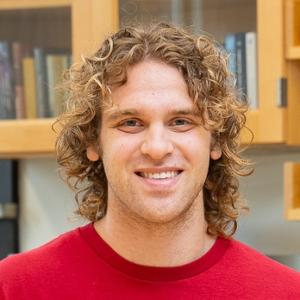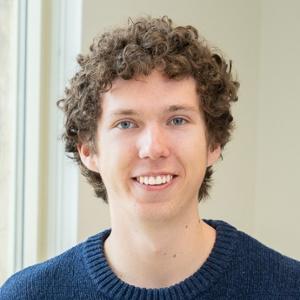
While receiving the award is a feat in and of itself, the two geosciences majors were particularly excited when they heard that the other had won. Close friends since their first year at Hamilton, the pair had supported each other throughout the Watson application process.
“There were many qualified applicants who put in so much work, so the fact that we both got it was more than we could hope for,” Fredericks said. Haberstock agreed: “We had reconciled with the fact that one of us wouldn’t get the Watson — it was far too unlikely that we both would get it. I think that was why I was so overjoyed when he got in too … we somehow pulled this off.”
Andrew Fredericks '25
Major: Geosciences
Hometown: Cornwall-on-Hudson, N.Y.
Although the two share a major and — increasingly evident as we spoke — a sense of humor, the passions that fueled their Watson projects vary drastically.
Since Fredericks was a child, he has been fascinated by extinct life. He was naturally drawn to the sciences in college, pursuing a major in geosciences and a minor in biology, and discovered he enjoyed the creative process of scientific exploration and research. This prompted discussions with Assistant Professor of Geology Cat Beck whose research in Kenya is near an important fossil site for the Homo erectus species.
“I quickly became interested in the idea that there used to be other species of humans,” Fredericks said. “There were other cultures that are now entirely wiped out, potentially with sophisticated lifestyles or language, and certainly sophisticated tool usage. This idea of encountering another type of human was the hook that really got me interested in human evolution.”
Fredericks’ Watson will take him to countries with exciting human evolutionary discoveries: Germany, Georgia, and Kenya for their fossil sites of early hominins, and Brazil for its population of chimpanzees that have developed a unique ability to use tools.
Charlie Haberstock '25
Majors: Geosciences and Economics
Hometown: Waterville, Maine
In contrast, Haberstock’s project will take him to some of the most isolated towns in Canada, Finland, Greenland, and Tristan da Cunha, the world’s most remote inhabited island. Coming from a rural town in Maine, he has always felt drawn to these types of places. His project will tie this long-term passion into his academic pursuit of economics, his second major. He plans to study the issues faced by remote economies as globalization leads to a dangerous feedback loop of economic depression and depopulation.
“People leave, the economies become depressed, industries relocate, and there’s less to attract new residents,” Haberstock said. “As more and more people leave, it threatens entire cultures, traditional practices, and a rural way of life that’s important to myself and so many others.” Haberstock plans to immerse himself in these communities to study the ways that leaders are fighting against this trend.
“We’ll be doing something nobody else has ever done – our exact projects and countries, something really unique to us – but at the same time we’ll have this community of people who have had the experience and know how to support us through that.”
The pair will also have the Hamilton Watson community to rely on for support. Fredericks was grateful to previous Hamilton Watson alumni, including Dylan Morse ’22, who provided advice throughout the process and reached out when the recipients received the award.
“The Watson is a really intense and unique experience, so people who come out the other side of it have this brotherhood,” Fredericks said. “We’ll be doing a [specific project] that in some ways, nobody else has ever done. But at the same time, we’ll have this community of people who have had a similar experience and know how to support us through that.”
Fellowship Advising at Hamilton
Students interested in learning about the Watson Fellowship should contact Director of Student Fellowships Lisa Grimes.
Posted April 9, 2025




